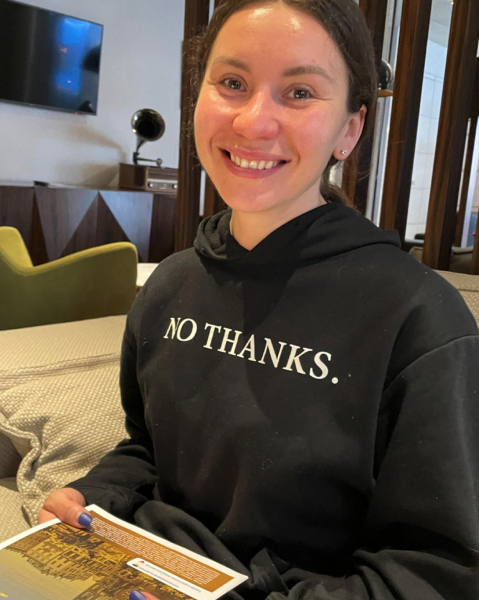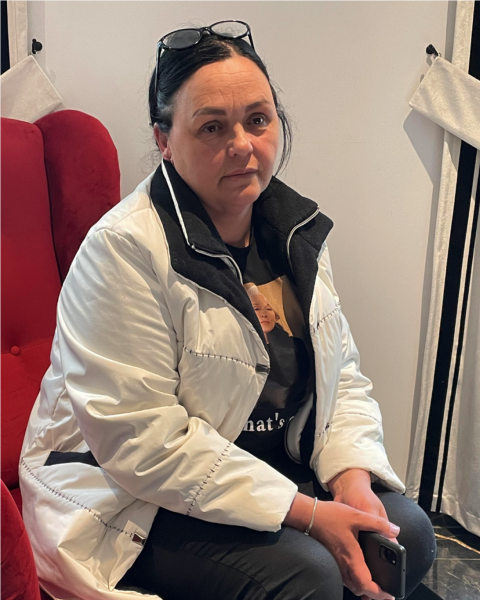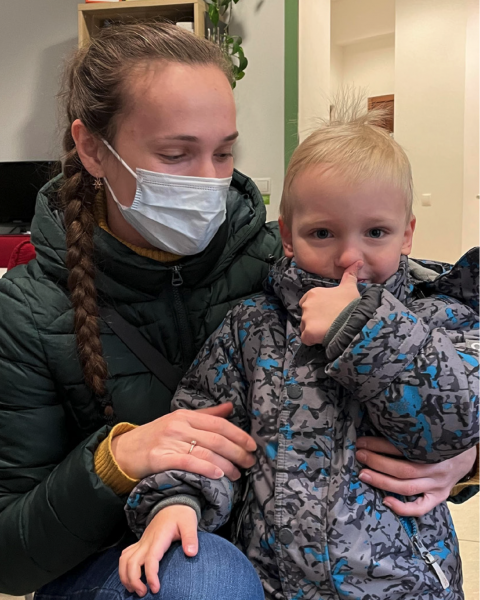A Collective Portrait of the Ukrainian Refugee Experience
“At that time and in that atmosphere it seemed the only conceivable thing to do.” So wrote George Orwell in 1938 about going to Catalonia to fight in the Spanish Civil War, and it captures exactly how I felt in February when Russia invaded Ukraine. I couldn’t join the fight – I’d be no use at all on a battlefield. But I wanted to help in any way I could. So I flew to Poland, hoping to help provide relief for the Ukrainian refugees streaming into Europe.
By the time I arrived in Krakow, Poland’s second largest city, there were more than two million refugees in Poland – just over 5 percent of the population. The Polish people had opened their arms to welcome the newcomers. There were blue and yellow flags everywhere and public signage. Even local shopkeepers were stepping up. One grocery store posted a sign on a shopping cart near the exit: “Please take an item from your bag to help feed our Ukrainian visitors.”
My destination was the Jewish Community Centre of Krakow, once devoted to rebuilding Jewish life in the shadow of the Holocaust, now serving some 1,000 Ukrainian refugees a day, Jewish and non-Jewish. I’d never volunteered before. I had no idea what to expect, but I was prepared to ladle soup or unpack boxes – whatever it took. Instead, the JCC suggested I interview some of the refugees it was serving.
Between late March and late April, I interviewed 45 displaced Ukrainians. The youngest were university students; the oldest was an 86-year-old Holocaust survivor. Most but not all were women – with a few exceptions, fighting-age men were not allowed to leave Ukraine in those months
They came from every stratum of Ukrainian society: a couple of cleaning ladies and skilled tradesmen, but also accountants, entrepreneurs, several engineers and a university professor. Some lived in places where the war was raging – nonstop shelling, tanks in the streets. Others, often no less traumatized, had traveled from cities largely untouched by fighting.
Every story was unique – one individual’s painful journey. But together, they add up to a collective portrait of the Ukrainian refugee experience.
Iryna

The hardest moment for Iryna was on the train leaving Ukraine. People were pushing and shoving. There were no seats. She, her mother and her 12-year-old daughter spent the long ride sitting on the floor. She had had a hellish week under bombardment in Kharkiv and kept her calm throughout. But this was too much. She almost broke down.
Just 30 miles from the border, Kharkiv is in range for missiles fired from Russia, and it came under intense bombardment on the first day of the war. Iryna hesitated to leave the city – she kept hoping the shelling would stop – and she spent a week in the basement of her apartment building, afraid to go upstairs even for a shower.
When she finally decided to leave Kharkiv, her husband drove her and her mother and daughter west to Lviv. What should have been a 12-hour trip took six days of standing in traffic and waiting at checkpoints. But they thought the rest of the journey would be easy: a short train ride from Lviv to Poland.
They saw they were wrong as soon as they got to the station in Lviv. There were thousands of people waiting and no trains. Finally, after seven hours, a first locomotive appeared. Iryna’s husband helped his family squeeze into a crowded carriage and said goodbye – fighting-age men weren’t allowed to leave Ukraine.
Iryna began to panic almost as soon as the train departed. Her mother and daughter tried to calm her, but it only got worse, and when they stopped at the border four hours later, she jumped out of the train. “Come get me,” she pleaded with her husband. “I can’t take it. Come get me.
Somehow, he managed to console her and she got back on the train.
She was surprised by the throng of volunteers waiting at the first station in Poland. They stood out in their bright dayglow vests, offering every kind of help imaginable: water, hot food and drinks, blankets, diapers, SIM cards, even pet food for her dog. She and her family were grateful, but it made her uncomfortable to take the help – if anything, it reminded her just how helpless she was.
She tried to make it on her own in Krakow. The family stayed with an acquaintance for a few nights, but then moved out – Iryna didn’t want to be a burden. She looked frantically for an apartment but couldn’t find one. Finally, she came across the JCC – she’d heard about it from a volunteer at the station – and staff offered a hotel room. By then, she felt she had little choice.
What’s next for her? She has resisted taking any steps to settle in Krakow. She says it’s too soon to enroll her daughter in school – for now, the girl just needs to rest. Iryna has declined to register with municipal authorities – a step that would get her a small stipend. She says she doesn’t want the money. About moving out of the hotel room to an apartment, she isn’t ready.
Conflicted as she is, she’s grateful for the help she has received. “Every person who gives food, every person who donates water, everyone who buys a box of cookies to give hope to a child – there’s just no way to thank them,” she says. “It’s that kindness that keeps me going.”
But all she really wants, she says, is to return to Ukraine. She can’t wait to start restoring Kharkiv, “stone by stone and building by building.”
Tatiana

Tatiana’s first thoughts when the Russians invaded – her worst fears – weren’t about herself, but about her pregnant daughter Miroslava. Miroslava was staying with her parents in Kharkiv’s giant residential district, Saltivka, where Tatiana, 50, worked as a building administrator. When the first shells burst, the two women looked out the window and saw what appeared to be lightning followed by a deafening crash. Miroslava collapsed on the floor, shaking and screaming, and Tatiana was unable to calm her.
Things only got worse in the days that followed. Mother, father and daughter drove back and forth across the city several times under heavy shelling, first to retrieve Miroslava’s medical records from her apartment and then because they were unsure which of the two neighborhoods would be more dangerous for the unborn child.
The bombardment was more intense in Saltivka, but a nearby maternity ward beckoned. After a few days, Miroslava got a place at the hospital, where she lived in the basement for two weeks as Russian missiles destroyed the high-rises around her.
One day in mid-March, Tatiana had taken refuge in her own basement when Miroslava called. “Please bring my stuff. There are some volunteers here. We’re leaving for the train station in 10 minutes.”
Miroslava didn’t want to go without her parents – she was convinced she’d never see them again. But Tatiana insisted, and the volunteers drove off into the shelling. Miroslava lay on the floor of the train for most of the long trip to Lviv, then found a van heading for Krakow
Tatiana tried to follow in Miroslava’s footsteps a few days later and had an even harder, more harrowing trip. By then, there were fewer trains, and they were more crowded, so she chose to go by bus. What she didn’t know: many roads were impassable, and drivers were constantly changing routes to avoid Russian checkpoints.
Tatiana managed to get a place on an evacuation bus, but after a few hours, it stopped in a forest, and passengers were told to get out. Then there was a second bus and a third and a fourth, and after nearly two days on the road, she arrived in Warsaw, still many miles from her daughter in Krakow.
In Poland, the family’s luck seemed to change. Miroslava was met by volunteers who got her medical attention and found her an apartment. By the time Tatiana arrived, her daughter was settled and hopeful. The owner of the flat said the family could stay as long as they needed. Miroslava felt she was getting good care in a Polish hospital; she was looking forward to giving birth. Both women exhaled for the first time in a month, and baby Maria arrived on March 24.
Then the second shoe dropped: Tatiana’s second trial. Her mother-in-law, Ana, lived in a village about an hour’s drive from Kharkiv, on the road to Donbas. Ana and Miroslava had always been close. The younger woman had loved visiting her grandmother in the country and playing in her garden, and when Maria was born, one of the first things Miroslava did was call the village.
“We’re fine,” Tatiana remembers her daughter telling the older woman. “Just hang on for a little while longer. We’ll be back soon. You’ll hold the baby, and everything will be fine.” But Ana was in a black mood. “You don’t see what I see out in the street,” she told her granddaughter. “We don’t stand a chance.”
The call came the next day from a neighbor in the village. Ana was dead, lying in her yard without a pulse. But the Russians were too close – the neighbor was unable to retrieve the body. A day or so later, Tatiana managed to connect with Polish authorities who had access to satellite imagery of the village, and they confirmed: there was a corpse lying in the yard.
Tatiana still doesn’t know the cause of death – perhaps a shrapnel wound or a head injury after being knocked down by a shock wave – or where the old woman is buried.
Back in Krakow, life goes on. Maria is healthy and growing. Miroslava feels comfortable in Poland and is thinking that perhaps she’d like to stay even after the war is over.
A strong, determined woman used to taking charge and helping other people, for the first time in her life, Tatiana felt she needed some help, and she found psychological counseling through the JCC.
She speaks daily to her husband, still in the Kharkiv region, and dreams of going back. But in the short term, she says, what she needs is a job. Neither her husband nor her daughter is working, and she is tired of relying on others.
“I don’t want to be a burden,” she says. “We appreciate the help. But I don’t like feeling needy and helpless. I need to find a way to support myself and my family.”
Katya and Timofey

February 24, the day Russia invaded Ukraine, was supposed to be a festive day for Katya, 27, and her family – it was her husband’s birthday. Instead, they woke up to the sound of bombardment, and from their 14th-floor apartment, they could feel their building swaying.
Katya, her husband and her 3-year-old son, Timofey, spent a day in a basement shelter in Brovary, on the outskirts of Kyiv. Then they drove to her parents’ house, about 200 miles south. But it was no safer there. They couldn’t escape the sound of shelling or the terror that came with it, and Katya made the tough decision to leave the country.
Getting to Poland wasn’t easy. Her husband drove her to the Hungarian border; she had friends in Budapest who she thought would help her. When that fell through, she considered Israel – she isn’t Jewish, but her husband is, and he has Israeli citizenship. But he hadn’t liked the Middle East, and she wasn’t ready to travel that far without him.
So when a volunteer suggested Krakow, she decided to try it. Her husband drove her north to the nearest crossing point, and she and little Timofey walked across the border into Poland.
In Krakow, she connected with volunteers who helped her find an apartment that she and her son share with another Ukrainian refugee. It’s not a permanent solution: the owner is a Pole working in Germany who will eventually return to claim the flat.
But Katya is coping day-to-day, managing to feed and clothe herself with what she finds at humanitarian aid distribution points. She heard about the JCC from a friend and came looking for a coloring book. Now, she visits regularly to pick up food and other essentials.
What does the future hold for her? She’s trying to make sense of what she’s been through. “Even now,” she says, “it all feels so far away – as if it never happened or happened to someone else.”
Unlike many Ukrainian refugees, she isn’t sure she wants to go home. “The country will have to be rebuilt from scratch,” she says anxiously. She’s also worried about the mines she knows the Russians have strewn everywhere. “I’m not sure I can ever feel safe in Ukraine after what we’ve been through,” she explains.
Most important, she’s convinced that her son would have a brighter future in Europe. “There will be more opportunities for education and more jobs for both of us.”
For now, she’s comfortable in Poland and looking for a class where she can start learning Polish. She hopes her husband will be able to join her soon, and together they’ll make a decision about where to go next. “Human beings are adaptable,” she says, “surprisingly so. I just want the best for my son.”
Postscript
In early fall, I tried to track down the refugees I’d interviewed and was able to get in touch with half of them. Nine of those I could find – nearly 40 percent – had returned to Ukraine, and a handful of others had gone on to a third country. But most were still in Krakow, watching and waiting as the war played out just a few hundred miles away.
Iryna had gone home – not to Kharkiv itself but somewhere in the area. Tatiana was visiting Ukraine, trying to establish Ana’s cause of death and looking for her grave, but Miroslava and the baby were settling in in Krakow. Katya and Timofey were not reachable – I had no phone number for them. But I imagined they too were still in Krakow and that maybe Timofey was attending a Polish nursery school, as many refugee children were, adapting if not integrating into life in Poland.
Meanwhile, Russia had launched a new offensive in Ukraine, threatening a nuclear strike and shelling cities far from the front line, and many in Poland were bracing for a second wave of refugees as the war raged on and a long, cold winter approached.
Tamar Jacoby is the president of Opportunity America, a US-based nonprofit promoting economic mobility. This essay is adapted from her new book, “Displaced: The Ukrainian Refugee Experience.”






